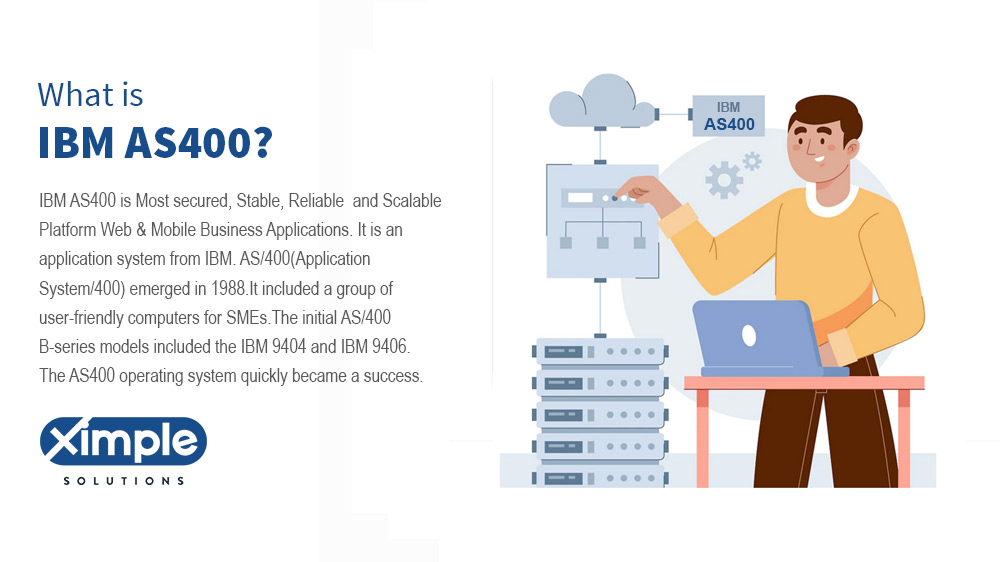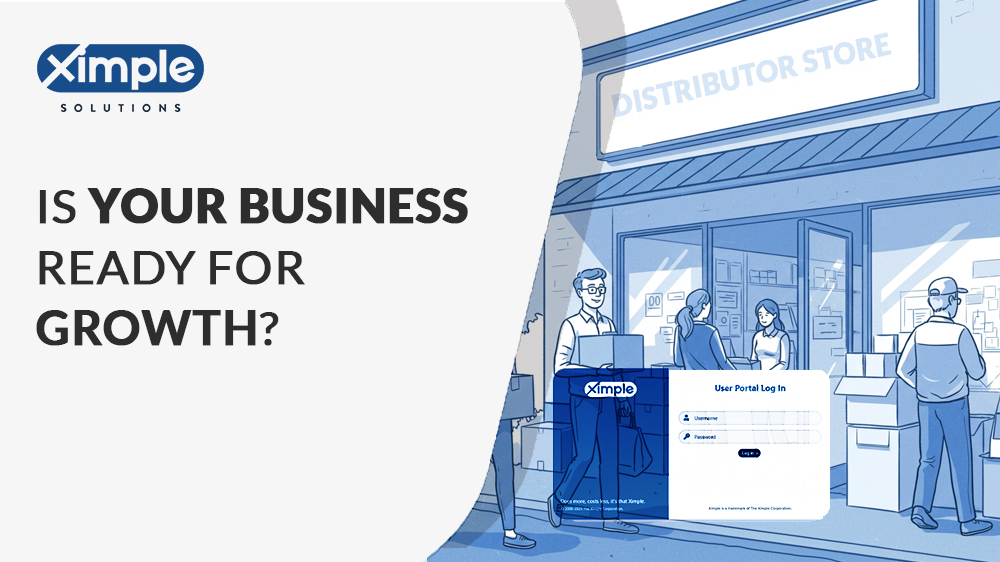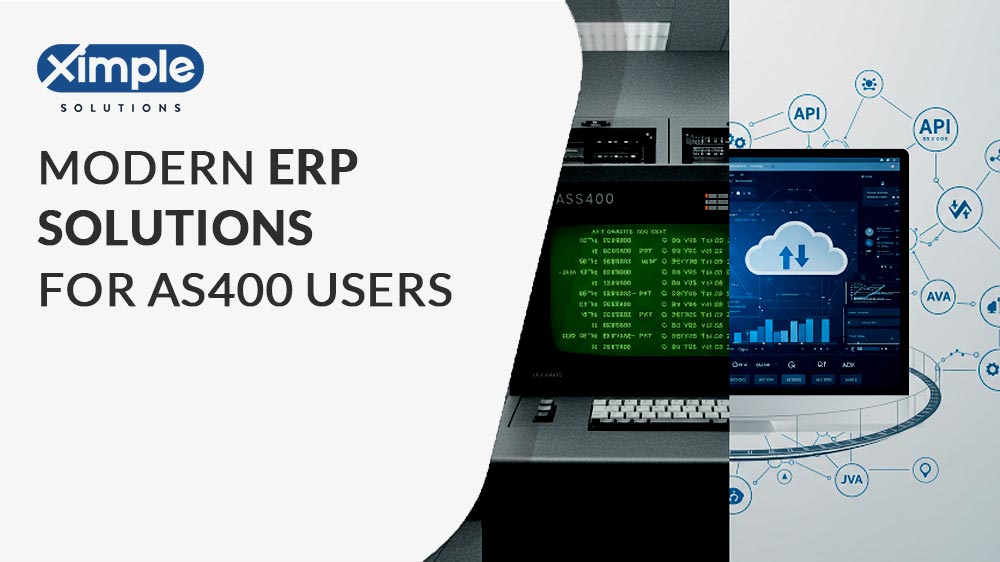ERP Comparison- Ximple versus Leading ERP Providers
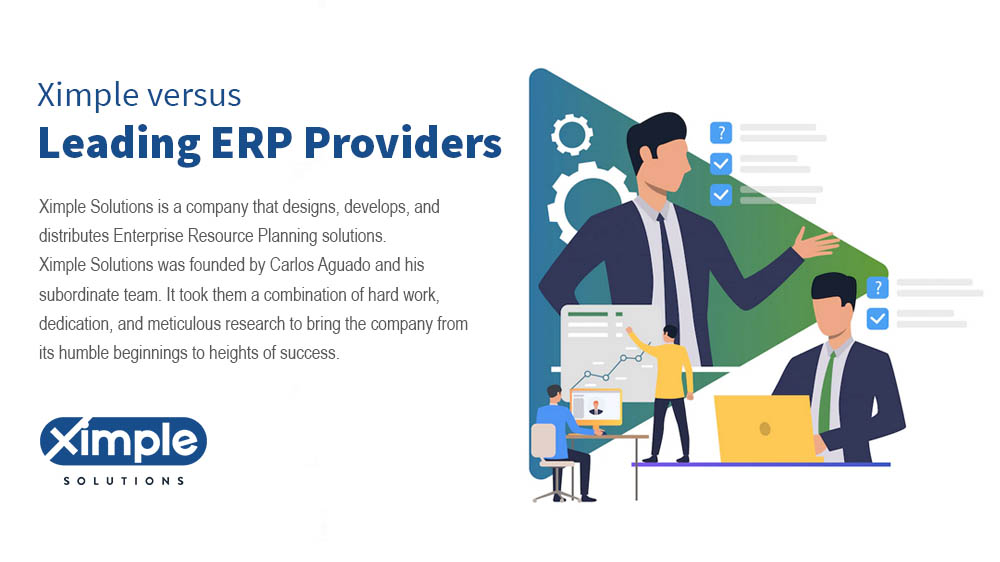
Enterprise Resource Planning software is an essential tool for businesses of all sizes and kinds. ERP does many redundant tasks, which can help reduce some of the overhead costs. With just one ERP software, a business can manage sales, accounting, finance, inventory management, warehouse management, human capital, projects, procurement, and customer relationships. Several software companies make this software, so you need to know how to select the best among many ERP software. In this review, we will do a comparison between different ERP systems. To be precise, we will perform an ERP System Comparison of Ximple Solutions’ ERP with other ERP Software in the industry. So, Let’s start with a short introduction to Ximple Solutions.

Ximple Solutions – Overview
Ximple Solutions is a company that designs, develops, and distributes Enterprise Resource Planning solutions. Ximple Solutions was founded by Carlos Aguado and his subordinate team. It took them a combination of hard work, dedication, and meticulous research to bring the company from its humble beginnings to heights of success. Although its ERP solution can help businesses of all sizes, the company focuses on medium-sized and large-sized organizations. Additionally, Ximple provides consultancy services on technology matters. As the leading ERP provider, Ximple excels in HVAC, Plumbing, Electrical, Fastener, Hose, and other industries. Its software consists of different modules that harmonize to offer the best customer experience. For ERP System Comparison first, we will pick Epicor Prophet 21.
Table of Contents
- Epicor Prophet 21 vs. Ximple Solutions – ERP Comparison
- Oracle Netsuit vs. Ximple Solutions – ERP Comparison
- Sage X3 vs. Ximple Solutions – ERP System Comparison
- QuickBooks vs. Ximple Solutions – ERP Comparison
- Microsoft Dynamics 365 Business Central vs. Ximple Solutions
- Sage Intacct vs. Ximple Solutions
- Conclusion
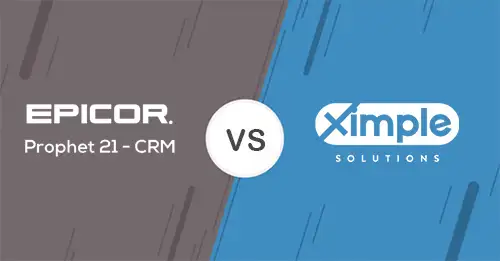
Epicor Prophet 21 vs. Ximple Solutions – ERP Comparison
a) Epicor Prophet 21: Overview
Epicor Prophet 21 is ERP software that runs on the cloud. It focuses on distributors in various industries. Epicor Prophet 21 has different modules and compatibility with Microsoft Azure. Also, the software can run on any browser and comes with the Epicor Virtual Agent app (EVA). As a result, distributors can access it on their mobile devices or computers. Epicor is so big that it is built on hierarchy and bureaucracy. In recent years it has been spun off many times that it is hard to keep track of. Recently it is controlled by a company that owns a distribution channel and thus Epicor can be a direct competitor of its customers. For ERP System Comparison with Ximple Solution, all modules of Ximple are listed below.
b) Modules- Ximple has the following modules:
- Sales
- Purchasing
- Warehousing and Inventory Management
- Delivery Route Setup
- Product Catalog
- Administration
- Employee Management
- Banking
- Billing
- General Ledger
- Accounts Payable
- Accounts Receivable
- Reporting
- Activity-Based Costing
- Bar Coding and Label Printing
- Check Reconciliation
- Contact Manager
- Cylinder/ Container Tracking
- Document Imaging
- eBusiness/eCommerce Platform
- Electronic Catalog
- EDI(Electronic Data Interchange)
- Electronic Mail
- E-commerce (B2B / B2C)
- Digital Payment
Epicor Prophet has the following modules:
- Sales Management
- Inventory and Supply Chain
- Value-added services
- Finance and Accounting
- Warehouse Management
- Business intelligence
- E-commerce
- Customer Experience
Winner Ximple Solutions.
c) Features
Regarding features, both software tools have plenty of them. The Epicor Prophet 21 has up to 21 features that help customers have an amazing experience. On the contrary, Ximple Solutions has seven more features, making the total 28. Ximple Solutions has a better User Interface and User Experience and thus makes it more intuitive. We also love the way Ximple has explained each feature in detail so that distributors can know beforehand what to expect.
Winner Ximple Solutions.
d) Industries
Epicor Prophet 21 focuses mainly on five industries. These are automotive, building supply distributors, manufacturing, and retail. If you click each category, you will notice different areas of coverage. Ximple Solutions serves up to twelve industries, and all of these are distributors which makes it a niche ERP for Distributors. We are in a dilemma when it comes to picking the best in terms of features. Ximple covers more distributors than Epicor. In contrast, Epicor covers more manufacturers and automotive businesses, which Ximple does not.
Winner Draw
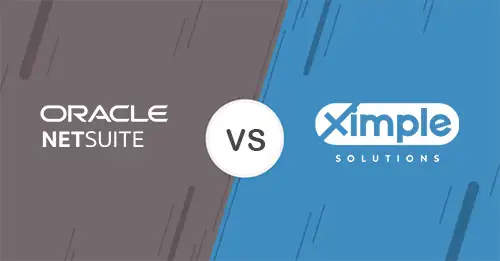
Oracle NetSuite vs. Ximple Solutions – ERP Comparison
a) Oracle Netsuite – Overview
Netsuite from Oracle is a popular ERP software. It is capable of carrying out different business processes in one central system. The estimated users of Netsuite software are over 18,000 in over 200 nations and territories.
b) Modules – Ximple has the following modules:
- Sales
- Purchasing
- Warehousing and Inventory Management
- Delivery Route Setup
- Product Catalog
- Administration
- Employee Management
- Banking
- Billing
- General Ledger
- Accounts Payable
- Accounts Receivable
- Reporting
- Activity-Based Costing
- Bar Coding and Label Printing
- Check Reconciliation
- Contact Manager
- Cylinder/ Container Tracking
- Document Imaging
- eBusiness/eCommerce Platform
- Electronic Catalog
- EDI(Electronic Data Interchange)
- Electronic Mail
- E-commerce (B2B / B2C)
- Digital Payment
Netsuite provides the following modules:
- Finance and Accounting
- Customer Relationship Management
- Professional services automation
- One database, one system
- E-commerce
- Retail
- Manufacturing
Winner Ximple Solutions.
c) Industries
Based on the number of industries served, Ximple Solutions wins. However, Ximple seems to focus more on distributors. In contrast, Netsuite covers unique industries such as Non-profit, Life Science, and professional services in addition to distributors and manufacturers. Overall, both software tools have enough coverage. Nevertheless, Netsuite has unique niches.
Winner Netsuite.
d) Plans
NetSuite is only a cloud-based solution. Hence, anyone looking to buy it has to have their ERP added to the cloud. They can only access it online. On the contrary, Ximple Solutions has two options: Cloud-based ERP and On-Premises ERP. Hence, Ximple gives customers the flexibility to choose the right ERP for their needs.
Winner Ximple Solutions
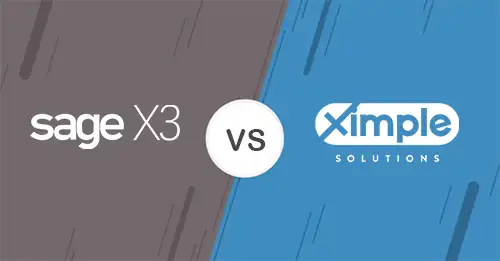
Sage X3 vs. Ximple Solutions – ERP System Comparison
a) Sage: Overview
Sage is known for its accounting software system that people from all over the world use. However, it also has an ultra-modern ERP system aimed at different industries. It is a cloud-based ERP system named Sage X3.
b) Modules – Ximple has the following modules:
- Sales
- Purchasing
- Warehousing and Inventory Management
- Delivery Route Setup
- Product Catalog
- Administration
- Employee Management
- Banking
- Billing
- General Ledger
- Accounts Payable
- Accounts Receivable
- Reporting
- Activity-Based Costing
- Bar Coding and Label Printing
- Check Reconciliation
- Contact Manager
- Cylinder/ Container Tracking
- Document Imaging
- eBusiness/eCommerce Platform
- Electronic Catalog
- EDI(Electronic Data Interchange)
- Electronic Mail
- E-commerce (B2B / B2C)
- Digital Payment
Sage has the following modules:
- Production Management
- Supply Chain Management
- Financial Management
Winner: Ximple Solutions
c) Industries
Ximple ERP covers distribution industry sectors. Hence, it can be helpful to distributors’ business needs. Conversely, Sage X3 has unique coverage for the Food and Beverage and Services business. It also covers different manufacturing businesses and distributors.
Winner: Sage X3 due to the unique sectors it covers.
d) Plans
Sage X3 is a cloud-based ERP that you can also access on a mobile device. On the other hand, Ximple ERP provides cloud and on-premise plans that you can also access on mobile devices.
Winner: Ximple Solutions
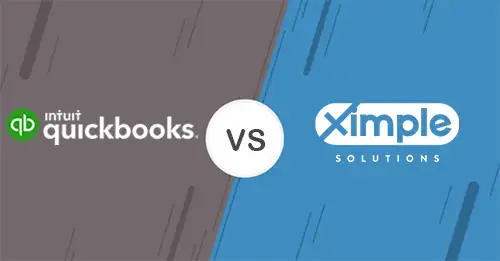
QuickBooks vs. Ximple Solutions – ERP Comparison
a) Quickbooks: overview
Many small to medium businesses handle their accounting work using QuickBooks software. It is a solution from Intuit and has been around for years. As businesses expand their operations beyond their country borders, they cannot just depend on QuickBooks. That’s when they would choose a full ERP. Quick Books have many limitations once the business grows beyond a certain point.
b) Modules – Ximple has the following modules:
- Sales
- Purchasing
- Warehousing and Inventory Management
- Delivery Route Setup
- Product Catalog
- Administration
- Employee Management
- Banking
- Billing
- General Ledger
- Accounts Payable
- Accounts Receivable
- Reporting
- Activity-Based Costing
- Bar Coding and Label Printing
- Check Reconciliation
- Contact Manager
- Cylinder/ Container Tracking
- Document Imaging
- eBusiness/eCommerce Platform
- Electronic Catalog
- EDI(Electronic Data Interchange)
- Electronic Mail
- E-commerce (B2B / B2C)
- Digital Payment
Quick Books has the following modules:
- Sales
- Purchase
- Accounting
Winner: Ximple Solutions
c) Cost-effectiveness
The price of QuickBooks varies based on the package that is suitable for your accounting needs. However, if your business has grown, you cannot rely only on QuickBooks. QuickBooks is not a full ERP. If you keep using it, you will start to notice more errors and downtime. It is cost-friendlier to use Ximple ERP because it grows with your needs. With Ximple, there is no need to buy separate software tools for your accounting or to manage other things. Therefore, Ximple is effective and cheaper to run in the long run.
Winner: Ximple Solutions
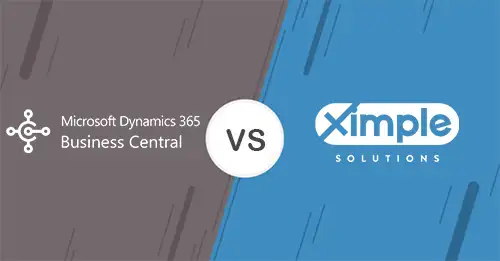
Microsoft Dynamics 365 Business Central vs. Ximple Solutions
a) Microsoft Dynamics 365 Business Central: Overview
This ERP was Navision before, and then it became Dynamics NAV. It integrates with Office 365 and other cloud applications from Microsoft. It is easy to customize and extend to match the specific needs of your industry.
b) Modules – Ximple has the following modules:
- Sales
- Purchasing
- Warehousing and Inventory Management
- Delivery Route Setup
- Product Catalog
- Administration
- Employee Management
- Banking
- Billing
- General Ledger
- Accounts Payable
- Accounts Receivable
- Reporting
- Activity-Based Costing
- Bar Coding and Label Printing
- Check Reconciliation
- Contact Manager
- Cylinder/ Container Tracking
- Document Imaging
- eBusiness/eCommerce Platform
- Electronic Catalog
- EDI(Electronic Data Interchange)
- Electronic Mail
- E-commerce (B2B / B2C)
- Digital Payment
Microsoft Dynamics 365 has the following modules:
- Sales Order Processing
- Warehouse Management
- Reporting and Analysis
- Project Management
- Service Management
- Manufacturing
Winner: Ximple Solutions
c) Plan
Dynamics 356 Business Central is a cloud-based solution that will mostly help accountants. Conversely, Ximple ERP is a comprehensive solution for distributors and is available between cloud ERP and on-premise ERP.
Winner: Ximple Solutions
Sage Intacct vs. Ximple Solutions
a) Sage Intacct: Overview
This is a GAAP-approved and AICPA-certified accounting and financial management solution. Ideal for all kinds of businesses regardless of size, Sage Intacct provides KPIs in real-time. It ensures better financial reporting and decision-making.
b) Modules – Ximple has the following modules:
- Sales
- Purchasing
- Warehousing and Inventory Management
- Delivery Route Setup
- Product Catalog
- Administration
- Employee Management
- Banking
- Billing
- General Ledger
- Accounts Payable
- Accounts Receivable
- Reporting
- Activity-Based Costing
- Bar Coding and Label Printing
- Check Reconciliation
- Contact Manager
- Cylinder/ Container Tracking
- Document Imaging
- eBusiness/eCommerce Platform
- Electronic Catalog
- EDI(Electronic Data Interchange)
- Electronic Mail
- E-commerce (B2B / B2C)
- Digital Payment
Sage Intacct has the following modules:
- Accounts Payable
- Accounts Receivable
- General Ledger
- Order Management
Winner: Ximple Solutions
c) Plan
Sage Intacct is a cloud-based accounting solution. In contrast, Ximple ERP has a cloud ERP and on-premise ERP. If you are looking for software that can do more than accounting, then you would rather go with Ximple.
Winner: Ximple Solutions
Conclusion:
Has your business outgrown its current software needs? Do you need software with more capabilities? Do you want to implement an ERP built on modern technology? If your answer is yes to these questions, you need comprehensive ERP software that meets your business needs. Based on our review after extensive study, Ximple Solutions’ ERP is the best choice. If you run a wholesale and distribution business, Ximple ERP will meet most of your business needs and is built on modern technology with continuous updates. This software suits several different distributors in over ten industries. You can opt for it if you want to achieve quick success without spending extra money and better customer service and support. Above all, Ximple can be cloud-based or On-Premise, which is one thing that puts it ahead of its competitors. Lastly, on the ERP software comparison checklist, Ximple ERP is more user-friendly, and scalable, and can guarantee an excellent user experience. It’s an ideal ERP solution for the wholesale distribution industry.

